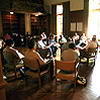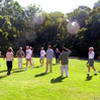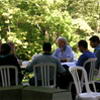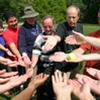Important Dates
- June 2 (extended)
- Paper submissions due.
- June 9
- Shepherding begins
- July 28
- Deadline focus group / workshop proposals
- Aug 4
- Second draft due for review
- Aug 7
- Notification of acceptance
- Oct 1
- Conference registration ends
- Oct 1
- Conference versions due
- Oct 23
- Patterns Bootcamp
- October 23-26
- PLoP Conference Days
- January 15, 2014
- Proceeding version due
Pre-PLoP Bootcamp
PLoP has a special pre-conference session aimed at people new to patterns, led by Rebecca Wirfs-Brock and Joe Yoder.
The BootCamp will be held on October 23, 2013
BootCamp Info
The PLoP experience provides something different, but needed, in the patterns community -- a "bootcamp" for newcomers.
The session will provide an introduction to patterns -- a training, mentoring, experiencing activity, where participants will be immersed in patterns and emerge with an enlarged perspective, their first pattern, and an ability to get more out of all PLoP conferences.
Writing your own first pattern is extremely important, since there is no better way to learn what patterns are all about!
The presentation format consists of a variety of lecture, discussion, group pattern writing, game playing, and writers' workshop - not necessarily in that order.
The only requirements are an open mind, ready to absorb the patterns experience, and an idea for a pattern you will craft at this pre-PLoP session.
Who Should Attend
The ideal attendee would have an interest in patterns, have an idea for a pattern that they want to write. The tutorial will benefit anyone participating in the PLoP conference.
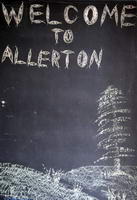
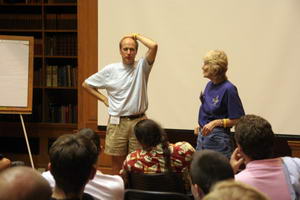
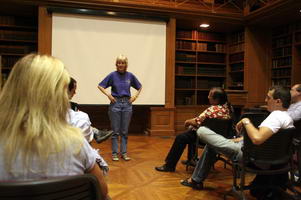
Goals
- Become part of the patterns community.
- Understand how good patterns are structured.
- See a variety of pattern formats and understand the trade-offs between the alternatives.
- Become comfortable with patterns reading and writing and, if you should decide to attend PLoP, have a better understanding of what goes on at the conference.
Presenters
Rebecca Wirfs-Brock is an internationally recognized leader in the development of object design methodologies, past board member of the Agile Alliance and IEEE Software design columnist. She invented the set of development practices known as Responsibility-Driven Design while at Tektronix. She was a Principal Software Engineer at Tektronix and managed the team that developed Tektronix’ first Smalltalk system. Among her widely used innovations are the conversational two-column form of use cases and object role stereotypes. Although best known as a software design guru she is also an innovator of techniques for simply expressing complex requirements and effectively communicating software architecture. She frequently helps product engineering, IT, and startup organizations with the technical bits as well as with effective teamwork and agile development practices. She consults, speaks, and writes on practical techniques for thinking about, designing, discussing, implementing, and describing software.
Rebecca blogs about software design and agile practices at The Responsible Designer. She is lead author of two software design books, Designing Object-Oriented Software and Object Design: Roles, Responsibilities and Collaborations. You can find her design columns, papers and presentations at www.wirfs-brock.com/Resources.html
Joseph W. Yoder is a founder and principal of The Refactory, Inc., a company focused on software architecture, design, implementation, consulting and mentoring on all facets of software development. Joseph is an international speaker and pattern author, long standing member of the ACM, and the President of The Hillside Group, a group dedicated to improving the quality of software development. Joseph specializes in Architecture, Analysis and Design, C#, Java, Smalltalk, Patterns, Agile Methods, Adaptable Systems, Refactoring, Reuse, and Frameworks. Joe is the author of many patterns, including being an author of the Big Ball of Mud pattern, which illuminates many fallacies in the approach to software architecture.Joe currently resides in Urbana, Illinois. He teaches Agile Methods, Design Patterns, Object Design, Refactoring, and Testing in industrial settings and mentors many developers on these concepts. Joe thinks software is still too hard to change. He wants do something about this and believes that with good patterns and by putting the ability to change software into the hands of the people with the knowledge to change it seems to be on promising avenue to solve this problem. On a personal side, Joe is also an avid amateur photographer, motorcycle enthusiast, and enjoys samba dancing!!!


